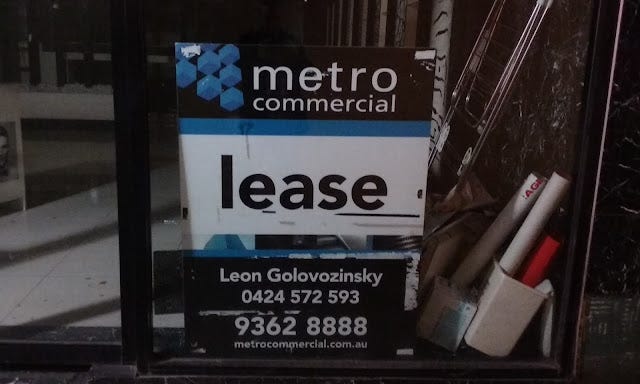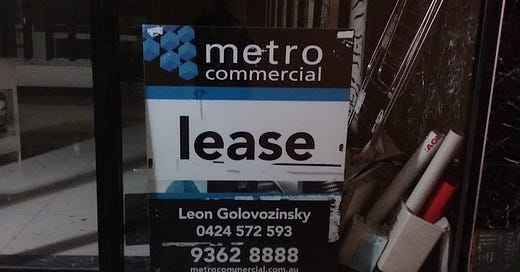
Picture by John Stapleton. A typical scene across Sydney
"Listen to me,"a voice said.
Well they were always saying something.
"We're here to help you. We're on your side."
Or far worse.
And then one day, after a particularly torrid mind mess where he had lured them down the most obscene routes, just to get rid of them, to shock them or help them to classify and thereby dismiss him, he heard it again, clear as a bell: "They were the military. We're different. We're here to clean up their mess."
Well that was as well may be, he didn't care for them either. We're from the government and we're here to help you. Any attempt at cooperation had long since disappeared; one disaster accruing on to another.
Trust no one.
New X-Files on the way.
They were frightened now, and stayed away, or bored. Bigger fish to fry.
He had done his best to bore them; and slept far more than usual.
Normally a sign of depression, but he was not depressed. Resigned, perhaps. Knocked sideways.
And then opportunity came knocking.
The rains drenched across Sydney. A man was swept off a yacht off Port Stephens. A hundred miles away, a hundred years away, every moment imprinted into history before being swept away.
He wished he could travel back through time, to undo a wrong. The person concerned, a disabled child, was probably already dead. It was almost 20 years before. In a world where people were being beheaded and crucified and burnt alive, dragged behind cars or bombed mercilessly from the sky, Obama shedding faux tears at gun victims while his bombs rained down on the Middle East, every last one of them designed to kill another Muslim and inflame an already out of control situation which they themselves had helped to create; well that was the world now. ONE BIG LIE.
Faith in government was at record lows.
MacDonalds was sponsoring the Australian Open, the one organisation most signally responsible for the decline in the health and eating habits of Australians, a significant driver behind record obesity rates. Australians had never been fatter or more inactive. Local business had never been more dire. The American giant had driven hundreds, thousands of small businesses, hamburger and a milkshake thanks, to the wall, while armies of bureaucrats strangled every single aspect of human behaviour.
Their repeated failures were, to them, only evidence of a greater need.
There were no plots that he could detect in the immediate vicinity.
No planned massacres.
But you didn't have to go very far West.
Into the world of the disenfranchised and disengaged; deranged, or justifiably angry.
The bureaucrats, their frontmen and women, the politicians, with an accompanying orchestra of polarised media, told one bifurcated story. The reality was an entirely different matter.
THE BIGGER STORY:
http://www.theaustralian.com.au/opinion/columnists/henry-ergas/itll-take-courage-to-remedy-a-world-gone-wrong/news-story/bc5a115d970c40e4deea44f52c0980b4
It’ll take courage to remedy a world gone wrong
THE AUSTRALIAN
DECEMBER 28, 2015 12:00AM
Henry Ergas
There are times when history escapes from the leash. And rarely has it done so more dramatically than in the past year.
But it is not only the sense of loss of control that marked 2015; it is the perception that Western governments are unable to tame the anarchy, much less renew hope.
The risk, as expectations are disappointed and fears stoked, is of a self-reinforcing process in which the declining legitimacy of public institutions saps the confidence required to restore world order, perpetuating the chaos and the horrors.
The public’s malaise is not difficult to understand. Even in the US, the economic recovery, currently in its sixth year, has not been strong enough to materially lift Middle America’s income and revive its faith in the nation’s strengths and prospects.
The optimism John Dewey exuded, when he wrote of the US that “everywhere, new possibilities beckon and arouse courage and effort”, seems tarnished beyond repair; so does the American Dream, which Bill Clinton described as the conviction that “if you work hard and play by the rules, you’ll be rewarded with a good life for yourself and a better chance for your children”.
No doubt, the election of President Barack Obama temporarily boosted the public mood; but it was the myth, not the man, that had won the day — and when a myth collapses, as Obama’s did long ago, it leaves a void bitterness quickly fills.
A report from the Pew Research Centre charts the consequences.
In every major national poll conducted since July 2007, no more than three Americans out of 10 have expressed trust in the federal government: the longest period of low trust in government since systematic polling began.
In 1957, when the question was first asked, 73 per cent of Americans said government did the right thing just about always or most of the time; now, that proportion is down to 19 per cent.
It is not that Americans think there are quick fixes to the country’s problems; it is simply that they no longer believe the federal government can credibly tackle them. Fractious, frustrated and fearful, their turning to characters such as Donald Trump is entirely unsurprising.
The situation in Europe — which this year, for the first time since the consolidation of the modern state system, completely lost controls of its borders — is even worse.
However commendable Angela Merkel’s intentions may have been, the concomitance of the flood of refugees with the terrorist attacks in Paris has destroyed what little there still was of the European project.
The Schengen Agreement on free movement within Europe lies in tatters; so does any common vision of the European future.
Of the supranational aspiration, only the shop-soiled rhetoric remains; but Europe’s political elites are unwilling to recognise its passing, much less sign its death certificate.
Nor has the euro fared any better. Yes, European Central Bank president Mario Draghi convinced markets he could prevent the eurozone from imploding; but he has not managed to convince them he can get it growing. If the best the eurozone can achieve is 1 to 2 per cent growth, as seems likely, its fiscal woes will prove ever more intractable, as will the social problems that are already tearing it apart.
Little wonder then that so much of the continent has been swept by anger and anxiety. In the short run, the elections in Spain and Portugal, which rejected austerity without endorsing any alternative, will add to the instability; but it is the longer-term effects of pervasive disillusionment that are most troubling.
Those effects were starkly on display in France’s recent regional elections. With fewer than a quarter of young people believing their lives will be better than their parents’, polls showed the Front National receiving support from 35 per cent of young voters, 50 per cent of blue-collar voters and 40 per cent of white-collar voters. For sure, once the left and centre-right parties combined their vote, it failed to pick up entire regions; but those parties’ unnatural entente will merely validate the Front National’s claim that its opponents are a cartel of unprincipled careerists and shortsighted opportunists.
It is not solely in the West that the major powers are in crisis. Views differ on how severe China’s economic difficulties are; what is clear, however, is that its Communist leaders, to whom so many Australian observers had ascribed talismanic qualities, are floundering. Yet with China struggling, the rest of the world economy is too weak to achieve rapid growth.
That can only make all of today’s problems more acute. An expanding pie is the best remedy to society’s heartaches, unleashing initiative and focusing attention on the future, rather than the past; but when growth slows to a halt, every issue becomes a zero-sum game, harshening divisions and making conflicts interminable.
And as those conflicts play themselves out, Western governments will be even less willing than they already are to bear the costs and risks of imposing international order.
None of that should be an invitation to hand-wringing. These are not signs preceding the end of the world; rather, they are a call to analyse what has gone wrong. And that requires honest discussion, including of fraught issues such as Islamic extremism.
In democracies, public understanding never moves towards the truth over a royal straight road; it must find its way, at times painfully, through the twists and turns of its confusions and contradictions. But the alternative to frank debate is a diminution of social possibility, as governments that distrust voters earn their distrust in return.
“Courage,” said Aristotle, “is the first of human virtues because it makes all others possible.” And there is no greater courage than the courage to “see what one sees”.




